 Violence against women is a worldwide problem, even in the United States of America.
Violence against women is a worldwide problem, even in the United States of America.
One in five women in the United States have been sexually assaulted
In the wake of the recent #MeToo movement, sexual assault and violence against women in American and other Western countries have made headlines in unprecedented volume. According to a 2010 survey by the Centers for Disease Control and Prevention, one in five women have experienced some form of sexual assault in the United States, and many say they have been raped.
The shame and ridicule associated with talking about sexual assault, along with the seeming inaction of law enforcement, have led many women to keep silent, believing their story was not worth sharing. But in 2017, when allegations of sexual misconduct against Hollywood movie producer Harvey Weinstein became public, many women broke their silence and shared their negative experiences. The impact of their voice led TIME magazine to name this group of women the Person of the Year, calling them “The Silence Breakers.”
There’s also the problem of women experiencing an assault on America’s college campuses. It’s escalated to the point where the college environment has been labeled as a “rape culture” in which men can get away with sexual assault.
In 2015, The Association of American Universities surveyed 27 campuses in the United States and found that 23 percent of female undergraduate students had experienced sexual assault or sexual misconduct. The United Nations Entity for Gender Equality and the Empowerment of Women also reported: “Around 120 million girls worldwide (slightly more than 1 in 10) have experienced forced intercourse or other forced sexual acts at some point in their lives.”
The staggering numbers of this brutal violence against women cannot be ignored. While it’s an issue in our own backyard—preventing violence against women presents unique challenges all around the world.
Throughout the centuries, women have silently suffered violence at the hands of their husbands who were supposed to love them, at the hands of their close and distant relatives who were supposed to care for them, and at the hands of strangers who were never supposed to have their hands on them in the first place.
Violence against women in South Asia is particularly high.
Gospel for Asia (GFA) field partners see the effects of this violence firsthand as they minister to battered women, abused daughters and neglected widows.
A World Bank Report noted that there is some degree of son preference is evident in most societies. This may be associated to some degree with sons carrying on the family name or becoming sources of additional income.
I have yet to read a report that observes the obvious: That boys from families where they are regarded with value and girls are not, are raised to believe that their “family values” are normal. Not only do girls and women in those families suffer violence and abuse, the sons accept that abuse as normal. Thus, the men who should be their protectors become their persecutors. Those boys become men who do not see women as made in the image of God. They come to regard them as someone or something of lesser value, if of any value at all.
The point of this article is not to demonstrate that women in one part of the world experience more abuse and violence than in others. It is to point out that a slap is a slap, a punch is a punch, and an insult is an insult. Each is painful, regardless of who on earth or where on earth the unfortunate recipient may be.
The world has yet to see a practical, workable solution to the problem of violence against women. Women may be persecuted in India, but they are also persecuted in Indiana. They may be abused in Bhutan, but they are also abused in Boston and Birmingham. This is not a problem of cultures. This is a cross-cultural problem deeply seated in hearts corrupted by a distorted disregard for the epitome of God’s creation that struck Adam with awe above all other creatures.
Violence against women will end when men come to regard women as the special companion God intended them to be. When men begin to see women through God’s eyes, their hearts and minds will change, and they will treat them with the same kindness and grace that our loving God does.
Pray with us as we minister to men and demonstrate the love of Jesus. Pray for those to whom we encounter that they will respond to that love as we let God’s love shine through us. Pray that they will be transformed by that perfect love and that, too, will demonstrate it to their wives, mothers, and daughters. Pray that they will teach their sons to be godly men who treat women with dignity and respect.
Godly men. That’s what will end violence against women.
Initial portions of this blog are excerpted from the Gospel for Asia Special Report, “Ending Violence Against Women.” Click on the link to read the entire report.




